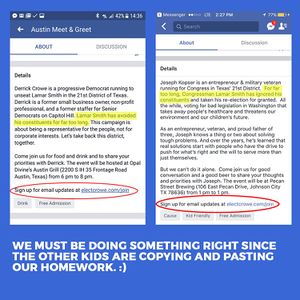Texas' 21st Congressional District election (March 6, 2018 Democratic primary)
- General election: Nov. 6
- Voter registration deadline: Oct. 9
- Early voting: Oct. 22 - Nov. 2
- Absentee voting deadline: Nov. 7
- Online registration: No
- Same-day registration: No
- Voter ID: Photo ID required
- Poll times: 7:00 a.m. to 7:00 p.m.
Army veteran Joseph Kopser won the Democratic primary runoff election on May 22, 2018.
Kosper and primary challenger Mary Wilson were the top two vote-getters in the primary election for Texas' 21st Congressional District election, and both advanced to a runoff election that was held on May 22 since neither received more than 50 percent of the vote. Wilson received 30.90 percent of the vote and Kopser received 29.03 percent. The two defeated Derrick Crowe and Elliott McFadden. For more information about the primary runoff election, click here.
The winner of the primary runoff faced the winner of the Republican runoff for the seat of incumbent Lamar Smith, who announced that he would not seek re-election in 2018 on November 2, 2017, leaving the seat open to a newcomer.[1]
Kopser led the field in funds raised as of December 31, 2017, reporting about $678,000 in total contributions with $260,000 of those in the last quarter of 2017. That amount was more than any of the 18 Republican candidates who filed for the seat raised in the same quarter. Crowe reported the next-highest funds raised in the Democratic race with $120,000 in contributions at the close of 2017.[2][3]
Although this seat was rated Safe Republican or Likely Republican by ratings outlets as of February 5, 2018, the four Democratic candidates could have made it a competitive election, depending on who had won the primary.[4] Donald Trump (R) won the district by 10 points in 2016. Mitt Romney (R) won it by 21.9 points in 2012.
| Texas voter? Dates you need to know. | |
|---|---|
| Primary election | March 6, 2018 |
| Candidate filing deadline | December 11, 2017 |
| Registration deadline | February 5, 2018 |
| Absentee application deadline | February 23, 2018 |
| General election | November 6, 2018 |
| Voting information | |
| Primary type | Open |
| Early voting deadline | March 2, 2018 |
| Polling locations: Go to this page to find early voting locations and your assigned precinct for election day. | |
For more on related elections, please see:
- Texas' 21st Congressional District election (March 6, 2018 Republican primary)
- Texas' 21st Congressional District election, 2018
- United States House Democratic Party primaries, 2018
- United States House Republican Party primaries, 2018
- Democratic Party primaries in Texas, 2018
- Republican Party primaries in Texas, 2018
Candidates and election results
Mary Wilson and Joseph Kopser advanced to a runoff. They defeated Derrick Crowe and Elliott McFadden in the Democratic primary for U.S. House Texas District 21 on March 6, 2018.
Democratic primary election
Democratic primary for U.S. House Texas District 21
Candidate | % | Votes | ||
| ✔ |  | Mary Wilson | 30.9 | 15,736 |
| ✔ |  | Joseph Kopser  | 29.0 | 14,787 |
 | Derrick Crowe | 23.1 | 11,742 | |
 | Elliott McFadden | 17.0 | 8,667 | |
| Total votes: 50,932 | ||||
 = candidate completed the Ballotpedia Candidate Connection survey. = candidate completed the Ballotpedia Candidate Connection survey. | ||||
| If you are a candidate and would like to tell readers and voters more about why they should vote for you, complete the Ballotpedia Candidate Connection Survey. | ||||
Do you want a spreadsheet of this type of data? Contact our sales team. | ||||
Candidates
Top candidates
Derrick Crowe
Crowe has worked as a nonprofit professional and is a former senior staffer and small business owner. He worked as a staffer for House Democratic Leader Nancy Pelosi on Capitol Hill. He was communications director for the nonprofit SAFE and also worked for the Center for Public Policy Priorities and the Children’s Defense Fund. Crowe also served as a senior staffer for Citizens for Responsibility and Ethics. Crowe graduated from Texas Tech University in 2002.[5]
Crowe was the winner of a straw poll for the primary election conducted by the Bexar County Democrats on November 11, 2017.[6] He was backed by the progressive organizations Our Revolution Texas and Left Up To Us. Crowe reported $157,377 in contributions as of February 14, 2018.
Joseph Kopser
Kopser is a U.S. Army veteran and has worked in private industry. Leading up to the 2018 primary election, he was serving as president of the advisory and analytics firm Grayline as well as a member of the Defense Council of the Truman National Security Project. His other professional experience includes serving as the director of Texas Lyceum, a member of the board of directors of the Greater Austin Chamber of Commerce, and the chairman and co-founder of Bunker Labs Austin.[7]
Kopser's military experience includes serving as the department chair and professor of leadership and strategy at Texas Army ROTC and as the special assistant to the Army chief of staff. Kopser spent several years deployed in Iraq. He graduated from Harvard University with his M.P.A. and from the United States Military Academy at West Point with his bachelor's in aerospace engineering.[7]
Kopser was endorsed by state Sen. Kirk Watson (D) and state Rep. Donna Howard (D).[8] He led fundraising in this race as of the February 14, 2018, deadline, reporting $774,225 in campaign contributions.
Mary Wilson
Wilson earned a master's degree in mathematics from SUNY-New Paltz and studied theology at Austin Presbyterian Theological Seminary. Her career experience includes working as a pastor and teacher.[9]
List of all candidates
Timeline
Endorsements
| Democratic candidate endorsements | |||||
|---|---|---|---|---|---|
| Endorsement | Crowe | Kopser | McFadden | Wilson | |
| National figures | |||||
| Jason Kander, former Missouri secretary of state[14] | ✔ | ||||
| State officials | |||||
| State Sen. Kirk Watson (D)[8] | ✔ | ||||
| State Rep. Donna Howard (D)[8] | ✔ | ||||
| State Rep. Eddie Rodriguez (D)[15] | ✔ | ||||
| Former state Sen. Gonzalo Barrientos[15] | ✔ | ||||
| Local officials | |||||
| Travis County Judge Sarah Eckhardt[15] | ✔ | ||||
| Publications | |||||
| Austin Chronicle[16] | ✔ | ✔ | |||
| Organizations | |||||
| Education Austin[15] | ✔ | ||||
| National Nurses United[17] | ✔ | ||||
| Our Revolution Texas[17] | ✔ | ||||
| Left Up To Us[17] | ✔ | ||||
| Bexar County Tejano Democrats[17] | ✔ | ||||
| Democracy for America[17] | ✔ | ||||
| PAC's | |||||
| Circle C Area Democrats[17] | ✔ | ||||
Polls
- See also: Ballotpedia's approach to covering polls
The Bexar County Democrats conducted a straw poll for the Democratic primary on November 11, 2017. Derrick Crowe led the field with 42 percent. Elliott McFadden came in second with 24 percent, Mary Wilson had 20.7 percent, and Joseph Kopser had 13 percent.[6]
Campaign finance
The table below details the campaign finance reports submitted by the candidates in this race through February 14, 2018.[18]
Campaign tactics and strategies
Campaign advertisements
Joseph Kopser
|
Chip Roy
|
Campaign strategies
The table below contains quotes from each of the Democratic candidates or their campaign staff about campaign strategies for the race.
| Democratic candidates on their campaign strategies:[19] | ||||||||
|---|---|---|---|---|---|---|---|---|
|
Noteworthy events
Crowe discovers plagiarized work in Kopser's campaign materials
On January 15, 2018, the Huffington Post published an article outlining instances of candidate Joseph Kopser's campaign materials containing sentences from news and other sources without attribution. Two examples were cited in which the candidate answered questionnaires using verbatim responses from the news website Vox and another website called Alliance to Save Energy. The Huffington Post also listed examples that it said came from The Dallas Morning News, The Washington Post, and the Economic Policy Institute's website.[20]
Kopser's fellow candidate in the race Derrick Crowe discovered these examples through a website called Quetext and shared them with the Huffington Post. “You cannot copy and paste a true commitment to progressive values,” he said in a statement. “This plagiarism is a troubling act by Joseph Kopser, and it is part of a pattern that will spell certain defeat in a general election. Democrats in this district deserve better.”[21]
Prior to this, Crowe had pointed out that Kopser posted an event invite using a sentence identical to the one that appeared on Crowe's Facebook page. At the bottom of Kopser's invitation appeared a sentence asking invitees to “sign up for email updates at electcrowe.com/join,” which was Crowe's campaign website.[22]
Kopser campaign spokesman Ian Rivera said in a statement, "Deliberate steps were taken to prevent this from happening but, unfortunately, they were insufficient." Rivera said the Kopser campaign had a staff of 15 volunteers who drafted its policy responses and checked for plagiarism using an online service. “We’ll be shopping around for alternatives this week and we will make appropriate adjustments to the written text as formatted,” Rivera added.[20]
Campaign themes
Below are listed the policy positions on the candidates' campaign websites, if available.
Derrick Crowe
| “ |
Medicare for all Fixing the rigged economy Fighting climate change Net neutrality Combating racism Living wage now Act on automation College for all Women's rights LGBTQIA rights |
” |
| —Derrick Crowe's 2018 campaign website[24] | ||
Joseph Kopser
| “ |
My policy priorities have been largely influenced by three things. First, my life experience as a 20-year Army veteran, technology entrepreneur, and father of three daughters. Second, the three-decade disconnect between outgoing Rep. Lamar Smith and his constituents allowing the White House and special interests to be prioritized over Central Texans. And third, my interactions with citizens of TX-21 over the last year. Many proud Texans, like you and me, are concerned about our country but confident that hard work and vision will deliver solutions. They’re committed to establishing a government that works for them and reflects their interest in working together. They’re not afraid of hard decisions but want to base those decisions on facts, transparency, and with an eye toward the future and parity. Only two things will evolve my public positions: your input and verified scientific data. My commitment to the citizens of TX-21, however, will never waver. Your voice will be heard, your questions will be answered, and your values, priorities, and expectations of your member of Congress will establish a new model of service and effective representation for Texas and the United States.[23] |
” |
| —Joseph Kopser's 2018 campaign website[25] | ||
Kopser had detailed sections under the following headings on his website:
Early voting in Texas primaries, 2018
Click here to learn about historic early voting turnout for both parties in Texas in 2014 and 2018.
District election history
2016
Heading into the election, Ballotpedia rated this race as safely Republican. Incumbent Lamar Smith (R) defeated Thomas Wakely (D), Mark Loewe (L), and Antonio Diaz (G) in the general election on November 8, 2016. Smith defeated Matt McCall, John Murphy, and Todd Phelps in the Republican primary on March 1, 2016, while Wakely defeated Tejas Vakil for the Democratic nomination.[26][27]
| Party | Candidate | Vote % | Votes | |
|---|---|---|---|---|
| Republican | 57% | 202,967 | ||
| Democratic | Thomas Wakely | 36.4% | 129,765 | |
| Libertarian | Mark Loewe | 4.1% | 14,735 | |
| Green | Antonio Diaz | 2.4% | 8,564 | |
| Total Votes | 356,031 | |||
| Source: Texas Secretary of State | ||||
| Candidate | Vote % | Votes | ||
|---|---|---|---|---|
|
|
60.1% | 69,866 | ||
| Matt McCall | 28.9% | 33,624 | ||
| Todd Phelps | 5.7% | 6,597 | ||
| John Murphy | 5.3% | 6,200 | ||
| Total Votes | 116,287 | |||
| Source: Texas Secretary of State |
||||
| Candidate | Vote % | Votes | ||
|---|---|---|---|---|
|
|
59% | 29,632 | ||
| Tejas Vakil | 41% | 20,595 | ||
| Total Votes | 50,227 | |||
| Source: Texas Secretary of State |
||||
2014
The 21st Congressional District of Texas held an election for the U.S. House of Representatives on November 4, 2014. Incumbent Lamar Smith (R) defeated Ryan Shields (L) and Antonio Diaz (G) in the general election.
| Party | Candidate | Vote % | Votes | |
|---|---|---|---|---|
| Republican | 71.8% | 135,660 | ||
| Green | Antonio Diaz | 14.7% | 27,831 | |
| Libertarian | Ryan Shields | 13.5% | 25,505 | |
| Total Votes | 188,996 | |||
| Source: Texas Secretary of State | ||||
District analysis
- See also: The Cook Political Report's Partisan Voter Index
- See also: FiveThirtyEight's elasticity scores
The 2017 Cook Partisan Voter Index for this district was R+10, meaning that in the previous two presidential elections, this district's results were 10 percentage points more Republican than the national average. This made Texas' 21st Congressional District the 136th most Republican nationally.[28]
FiveThirtyEight's September 2018 elasticity score for states and congressional districts measured "how sensitive it is to changes in the national political environment." This district's elasticity score was 1.11. This means that for every 1 point the national political mood moved toward a party, the district was expected to move 1.11 points toward that party.[29]
State overview
Partisan control
This section details the partisan control of federal and state positions in Texas heading into the 2018 elections.
Congressional delegation
- Republicans held both U.S. Senate seats in Texas.
- Republicans held 25 of 36 U.S. House seats in Texas, and Democrats held 11.
State executives
- As of May 2018, Republicans held six of 11 state executive positions and five positions were held by nonpartisan officials.
- The governor of Texas was Republican Greg Abbott.
State legislature
- Republicans controlled both chambers of the Texas State Legislature. They had a 93-55 majority in the state House and a 21-10 majority in the state Senate.
Trifecta status
- Texas was a Republican trifecta, meaning that the Republican Party held the governorship, a majority in the state Senate, and a majority in the state House.
2018 elections
- See also: Texas elections, 2018
Texas held elections for the following positions in 2018:
- The Class 1 U.S. Senate seat held by Ted Cruz (R)
- All 36 U.S. House seats
- Governor
- Five lower state executive positions
- 15 of 31 state Senate seats
- All 150 state House seats
- Local judicial offices
- Local school boards
- Municipal elections in Arlington, Austin, Bexar County, Collin County, Corpus Christi, Dallas County, Denton County, El Paso County, Fort Bend County, Garland, Harris County, Irving, Laredo, Lubbock, Lubbock County, Nueces County, Tarrant County, Travis County, Webb County, and Williamson County
Demographics
| Demographic data for Texas | ||
|---|---|---|
| Texas | U.S. | |
| Total population: | 27,429,639 | 316,515,021 |
| Land area (sq mi): | 261,232 | 3,531,905 |
| Race and ethnicity** | ||
| White: | 74.9% | 73.6% |
| Black/African American: | 11.9% | 12.6% |
| Asian: | 4.2% | 5.1% |
| Native American: | 0.5% | 0.8% |
| Pacific Islander: | 0.1% | 0.2% |
| Two or more: | 2.5% | 3% |
| Hispanic/Latino: | 38.4% | 17.1% |
| Education | ||
| High school graduation rate: | 81.9% | 86.7% |
| College graduation rate: | 27.6% | 29.8% |
| Income | ||
| Median household income: | $53,207 | $53,889 |
| Persons below poverty level: | 19.9% | 11.3% |
| Source: U.S. Census Bureau, "American Community Survey" (5-year estimates 2010-2015) Click here for more information on the 2020 census and here for more on its impact on the redistricting process in Texas. **Note: Percentages for race and ethnicity may add up to more than 100 percent because respondents may report more than one race and the Hispanic/Latino ethnicity may be selected in conjunction with any race. Read more about race and ethnicity in the census here. | ||
As of July 2016, Texas had a population of approximately 27,862,596 people, and its three largest cities were Houston (pop. est. 2.3 million), San Antonio (pop. est. 1.5 million), and Dallas (pop. est. 1.3 million).[30][31]
State election history
This section provides an overview of federal and state elections in Texas from 2000 to 2016.
Historical elections
Presidential elections, 2000-2016
This chart shows the results of the presidential election in Texas every year from 2000 to 2016.
| Election results (President of the United States), Texas 2000-2016[32][33] | |||||
|---|---|---|---|---|---|
| Year | First-place candidate | First-place candidate votes (%) | Second-place candidate | Second-place candidate votes (%) | Margin of victory (%) |
| 2016 | 52.23% | 43.24% | 8.99% | ||
| 2012 | 57.17% | 41.38% | 15.79% | ||
| 2008 | 55.45% | 43.68% | 11.77% | ||
| 2004 | 61.09% | 38.22% | 22.87% | ||
| 2000 | 59.30% | 37.98% | 21.32% | ||
U.S. Senate elections, 2000-2016
This chart shows the results of U.S. Senate races in Texas from 2000 to 2016. Every state has two Senate seats, and each seat goes up for election every six years. The terms of the seats are staggered so that roughly one-third of the seats are up every two years.
| Election results (U.S. Senator), Texas 2000-2016[34] | |||||
|---|---|---|---|---|---|
| Year | First-place candidate | First-place candidate votes (%) | Second-place candidate | Second-place candidate votes (%) | Margin of victory (%) |
| 2014[35] | 61.56% | 34.36% | 27.20% | ||
| 2012[36] | 56.46% | 40.62% | 15.84% | ||
| 2008[37] | 54.82% | 42.84% | 11.98% | ||
| 2006[38] | 61.69% | 36.04% | 25.65% | ||
| 2002[39] | 55.30% | 43.33% | 11.97% | ||
| 2000[40] | 65.04% | 32.35% | 32.69% | ||
Gubernatorial elections, 2000-2014
This chart shows the results of the four gubernatorial elections held between 2000 and 2014. Gubernatorial elections are held every four years in Texas.
| Election results (Governor), Texas 2000-2016[41] | |||||
|---|---|---|---|---|---|
| Year | First-place candidate | First-place candidate votes (%) | Second-place candidate | Second-place candidate votes (%) | Margin of victory (%) |
| 2014 | 59.27% | 38.90% | 20.37% | ||
| 2010 | 54.97% | 42.30% | 12.67% | ||
| 2006 | 39.03% | 29.79% | 9.24% | ||
| 2002 | 57.81% | 39.96% | 17.85% | ||
Congressional delegation, 2000-2016
This chart shows the number of Democrats and Republicans who were elected to represent Texas in the U.S. House from 2000 to 2016. Elections for U.S. House seats are held every two years.
Trifectas, 1992-2017
A state government trifecta occurs when one party controls both chambers of the state legislature and the governor's office.
Texas Party Control: 1992-2026
Three years of Democratic trifectas • Twenty-four years of Republican trifectas
Scroll left and right on the table below to view more years.
| Year | 92 | 93 | 94 | 95 | 96 | 97 | 98 | 99 | 00 | 01 | 02 | 03 | 04 | 05 | 06 | 07 | 08 | 09 | 10 | 11 | 12 | 13 | 14 | 15 | 16 | 17 | 18 | 19 | 20 | 21 | 22 | 23 | 24 | 25 | 26 |
|---|---|---|---|---|---|---|---|---|---|---|---|---|---|---|---|---|---|---|---|---|---|---|---|---|---|---|---|---|---|---|---|---|---|---|---|
| Governor | D | D | D | R | R | R | R | R | R | R | R | R | R | R | R | R | R | R | R | R | R | R | R | R | R | R | R | R | R | R | R | R | R | R | R |
| Senate | D | D | D | D | D | R | R | R | R | R | R | R | R | R | R | R | R | R | R | R | R | R | R | R | R | R | R | R | R | R | R | R | R | R | R |
| House | D | D | D | D | D | D | D | D | D | D | D | R | R | R | R | R | R | R | R | R | R | R | R | R | R | R | R | R | R | R | R | R | R | R | R |
See also
- United States House of Representatives elections in Texas, 2018
- United States House elections in Texas (March 6, 2018 Democratic primaries)
- Texas' 21st Congressional District election (March 6, 2018 Republican primary)
- United States House of Representatives elections, 2018
Footnotes
- ↑ The Hill, "Lamar Smith to retire from Congress," November 2, 2017
- ↑ Federal Election Commission, "Candidates for House of Representatives," accessed February 5, 2018
- ↑ Statesman, "Democrats report big money hauls in Central Texas congressional races," February 2, 2018
- ↑ Ratings are based on projections found in Governing, Larry Sabato, The Rothenberg & Gonzales Political Report, Decision Desk HQ, and The Cook Political Report. These ratings are updated periodically throughout the election season.
- ↑ Derrick Crowe 2018 campaign website, "Meet Derrick," accessed January 31, 2018
- ↑ 6.0 6.1 Bexar County Democrats, "2017 Straw Poll Results," accessed January 31, 2018
- ↑ 7.0 7.1 LinkedIn, "Joseph Kopser," accessed January 31, 2018
- ↑ 8.0 8.1 8.2 Joseph Kopser 2018 campaign website, "Press Releases," accessed January 31, 2018
- ↑ Mary Wilson for Congress, "About," accessed March 17, 2018
- ↑ Derrick Crowe for Congress, "Home," accessed June 27, 2017
- ↑ Roll Call, "Rep. Lamar Smith Out of Touch With Science, Challenger Says," May 23, 2017
- ↑ Information submitted on Ballotpedia's biographical information submission form on May 24, 2017
- ↑ Mary Wilson for Congress, "Home," accessed July 11, 2017
- ↑ YouTube, "Jason Kander Endorses Kopser for Congress," March 2, 2018
- ↑ 15.0 15.1 15.2 15.3 Elliott McFadden 2018 campaign website, "Endorsements," accessed January 31, 2018
- ↑ Austin Chronicle, "Chronicle Endorsements," February 16, 2018
- ↑ 17.0 17.1 17.2 17.3 17.4 17.5 Derrick Crowe 2018 campaign website, "Endorsements," accessed January 31, 2018
- ↑ Federal Election Commission, "Browse Candidates for House of Representatives," accessed February 14, 2018
- ↑ 19.0 19.1 19.2 19.3 19.4 San Antonio Express News, "With Smith’s departure, Democrats see first real chance to win District 21," January 7, 2018
- ↑ 20.0 20.1 Huffington Post, "Democratic House Candidate’s Campaign Materials Full Of Plagiarized Work," January 15, 2018
- ↑ Huffington Post, "Significant Portions of Kopser’s New Position Statements Appear To Be Plagiarized," January 15, 2018
- ↑ Twitter, "Derrick Crowe on Twitter," July 26, 2017
- ↑ 23.0 23.1 Note: This text is quoted verbatim from the original source. Any inconsistencies are attributable to the original source.
- ↑ Derrick Crowe 2018 campaign website, "Issues," accessed January 31, 2018
- ↑ Joseph Kopser 2018 campaign website,' "My Values," accessed January 31, 2018
- ↑ Texas Secretary of State, "2016 March Primary Election Candidate Filings by County," accessed December 15, 2015
- ↑ The New York Times, "Texas Primary Results," March 1, 2016
- ↑ Cook Political Report, "Introducing the 2017 Cook Political Report Partisan Voter Index," April 7, 2017
- ↑ FiveThirtyEight, "Election Update: The Most (And Least) Elastic States And Districts," September 6, 2018
- ↑ United States Census Bureau, "QuickFacts Texas," accessed December 12, 2017
- ↑ United States Census Bureau, "QuickFacts Houston; San Antonio; Dallas," accessed December 13, 2017
- ↑ Federal Election Commission, "2012 Election Results for the U.S. President, the U.S. Senate and the U.S. House of Representatives," accessed December 13, 2017
- ↑ Federal Election Commission, "Official 2016 Presidential General Election Results," January 30, 2017
- ↑ Federal Election Commission, "Federal Elections 2014: Election Results for the U.S. Senate and the U.S. House of Representatives," accessed December 13, 2017
- ↑ Federal Election Commission, "2014 Official Election Results for United States Senate," accessed December 13, 2017
- ↑ Federal Election Commission, "2012 Official Election Results for United States Senate," accessed December 13, 2017
- ↑ Federal Election Commission, "2008 Official Election Results for United States Senate," accessed December 13, 2017
- ↑ Federal Election Commission, "2006 Official Election Results for United States Senate," accessed December 13, 2017
- ↑ Federal Election Commission, "2002 Official Election Results for United States Senate," accessed December 13, 2017
- ↑ Federal Election Commission, "2000 Official Election Results for United States Senate," accessed December 13, 2017
- ↑ Dave Leip's Atlas of U.S. Presidential Elections, "Texas Election Results," accessed December 13, 2017











